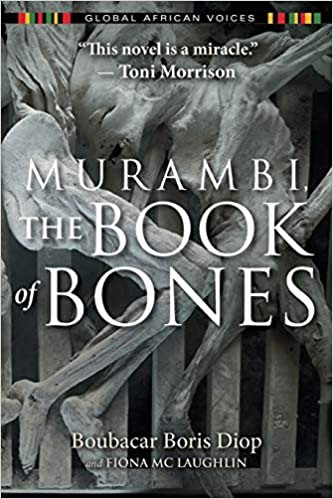
Bàmmeelu Kocc Barma

Second novel published by Boubacar Boris Diop in Wolof after Doomi Golo, Bàmmeelu Kocc Barma returns to the Joola shipwreck off the coast of the Gambia in 2002. The novel represents a memorial to Read more
DOOMI GOLO: THE HIDDEN NOTEBOOKS
The first novel to be translated from Wolof to English, Doomi Golo—The Hidden Notebooks is a masterful work that conveys the story of Nguirane Faye and his attempts to communicate with his grandson before he dies. With a narrative structure that beautifully imitates the movements of a musical piece, Diop relates Faye’s trauma of losing his only son, Assane Tall, which is compounded by his grandson Badou’s migration to an unknown destination . While Faye feels certain that his grandson Read more
MURAMBI, THE BOOK OF BONES
In April of 1994, nearly a million Rwandans were killed in what would prove to be one of the swiftest, most terrifying killing sprees of the 20th century. In Murambi, The Book of Bones, Boubacar Boris Diop comes face to face with the chilling horror and overwhelming sadness of the tragedy. Here, the power of Diop’s acclaimed novel is available to English-speaking readers through Fiona Mc Laughlin’s crisp translation and a compelling afterword by Diop. The novel recounts Read more
AFRICA BEYOND THE MIRROR
Besides chapters that pay homage to Cheikh Anta Diop and Mongo Beti, the wide variety of topics in this book include the dilemma of the writer who is stuck between two languages, the shipwreck of the Joola in Senegal, the continuing waves of migration towards Europe and the cultural challenges of globalization. The genocide of the Tutsis in Rwanda, which too many people are still trying to deny, has been given special importance. Projecting one’s gaze beyond the mirror means trying to expose the lies Read more
NAWETU DERET
A Season in the Congo translated into Wolof by Boubacar Boris Diop. When the Republic of the Congo becomes independent in 1960, Patrice Lumumba, a visionary politician, dreams of giving his fellow people their long-lost freedom. His assassination in January of 1961 marked the abrupt end of this ambition. By choosing to depict these fateful weeks through the vehicle of theater, Aimé Césaire crafts Lumumba into a luminous hero who stands tall when faced with the effects of the post-colonial world. A Read more




